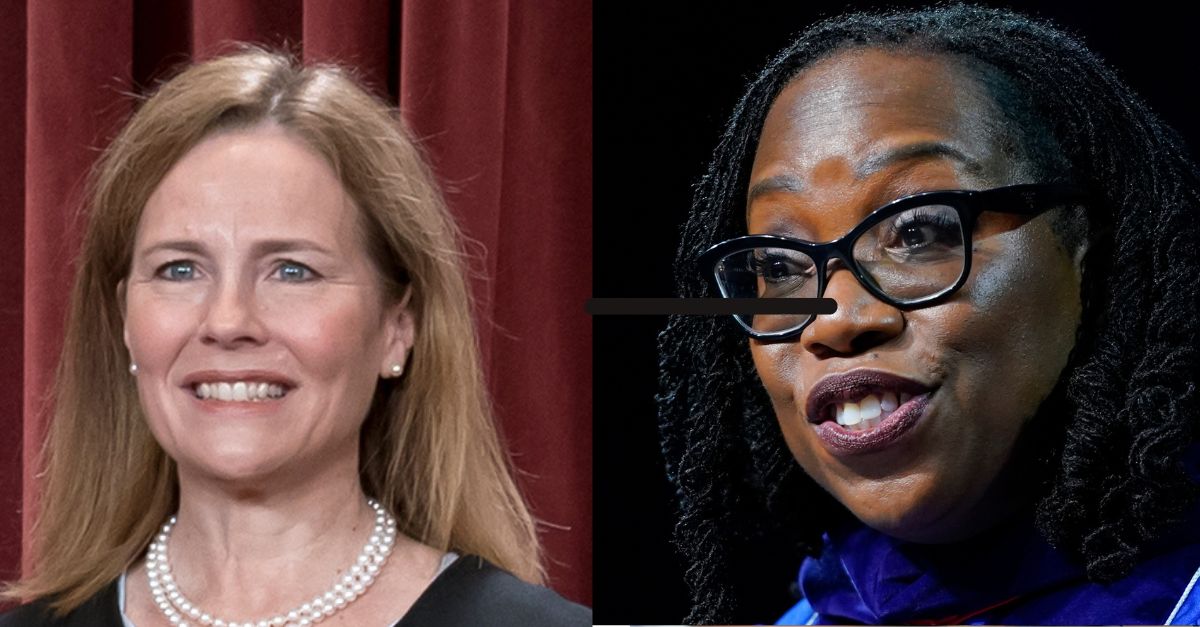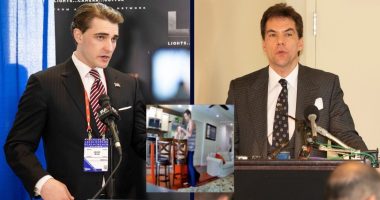
Left: Justice Amy Coney Barrett (via Erin Schaff/AFP/ Getty Images). Right: Justice Ketanji Brown Jackson. (via Patrick Semansky/AP).
Justice Amy Coney Barrett led a seven-member majority of the United States Supreme Court to reject a constitutional challenge to a criminal statute Friday and hold that encouraging someone to violate immigration law is not protected by the First Amendment.
Justice Ketanji Brown Jackson responded with a biting dissent that reduced Barrett’s opinion to “spin,” threw Barrett’s words back at her, and provided a lesson about the law can affect the less powerful.
The case involved a fraudster sentenced to 20 years in prison for falsely promising hundreds of undocumented immigrants that they could become U.S. citizens by overstaying their visas, paying a fee, and using “adult adoption.”
The convicted man, Helaman Hansen, won an appeal in the U.S. Court of Appeals for the Ninth Circuit by arguing that his statements to the immigrants are protected by the First Amendment, and that the statute relied on by prosecutors was overly broad. Under standard constitutional principles, a criminal statute would be void as overly broad if it does not define prohibited behavior narrowly enough and risks criminalizing behavior that is legally protected.
Justice Amy Coney Barrett wrote for the Court’s majority to reverse the Ninth Circuit’s ruling. Barrett said that the statute at issue — which prohibits speech that “encourages or induces” breaking the law regarding “bringing in an harboring certain aliens” — did not offend the Constitution.
Barrett reasoned that the words “encourage” and “induce” have “well-established legal meanings” and that interpreting the statute in a “specialized, criminal-law sense” protects it from overbreadth.
Despite the many examples of protected speech that could risk prosecution under the statute raised at oral arguments, Barrett was unwilling to acknowledge any real risk that well-meaning citizens would be subjected to criminal charges under the questionable law.
Barrett wrote that the Court does not believe there is a risk that the statute will “produce the horribles [Hansen] parades.” The justice contrasted what she called the “plainly legitimate sweep” of the statute, referring to its use in prohibiting things like fraudulent marriages and illegal transportation of immigrants, with the risk of its use to criminalize innocent speech.
“When we turn to the other side of the ledger, we find it pretty much blank,” wrote Barrett bluntly as she noted that Hansen failed to produce any evidence of prosecutions for overbreadth under the law.
Justices Ketanji Brown Jackson and Sonia Sotomayor, however, had no trouble imagining the statute’s potential use to prosecute protected speech. Jackson penned a 21-page dissent, joined by Sotomayor, which laid out both practical and legal reasons why the statute does not pass constitutional muster.
The dissent included examples that Sotomayor raised during oral arguments: “the grandmother who says she misses her noncitizen grandchild,” “the doctor who informs a noncitizen patient that a necessary medical treatment is more readily available in the United States,” the “college counselor who advises an undocumented student that she can obtain a private scholarship to attend college in the United States.” Though all would constitute examples of protected speech, each could fall within the statute’s umbrella for criminal conduct.
Read Related Also: Escaped Murderer Drowned in Ohio River, Medical Examiner Says
Jackson noted that similarly, the statute “would also punish abstract advocacy of illegal conduct” such as saying “I encourage you to live in the United States” — or even “I encourage you to obtain child pornography” (which the Court has previously ruled qualifies as protected speech under the First Amendment) could be criminally prosecuted.
Jackson was unimpressed with Barrett’s assurances that the statute would be used appropriately, and decried them as mere “spin.” Per the dissent:
The majority’s efforts to spin the encouragement provision’s enlightening enactment history in favor of the majority’s narrow interpretation are unavailing.
Then, for the second time in as many days, Jackson chastised her fellow justices for coming up with a reading of a statute that Congress simply did not intend.
Jackson, quoting Barretts words, wrote that “the majority offers no support at all” for its reading of the statute, and that instead, “it conjures up its own ‘simple explanation”” that amounts to nothing more than a “repackaging” of an unsupported analysis.
Jackson also took the chance to school Barrett’s majority about how the interplay between criminal laws and free speech can affect those in positions without privilege.
“The majority nevertheless derides the fears of Hansen and his amici as an overimaginative ‘parad[e]’ of ‘horribles,’” Jackson wrote. “But what may seem ‘fanciful’ to this Court at great remove might well prove to be a significant obstacle for those on the ground who operate daily in the shadow of the law.”
The justice continued, pointing out that the dangerous potential for chilling speech that could be affected by the law is evident in the wide array of amicus support “from lawyers, immigration advocacy organizations, religious and other charitable organizations, journalists, local governments, and nonprofit policy institutions from across the ideological spectrum.”
As has often been his practice, Justice Clarence Thomas penned a separate concurrence to advocate that the entire legal principle underlying the Court’s analysis be jettisoned and to complain that the justices should not be so quick to consider a law’s effects in cases separate from the one before the bench.
Thomas lamented Hansen’s case as an example of “just how far courts have drifted from their original station of adjudicating the rights of the parties before them in accordance with law.”
“In an appropriate case, we should carefully reconsider the facial overbreadth doctrine,” Thomas suggested.
Have a tip we should know? [email protected]









